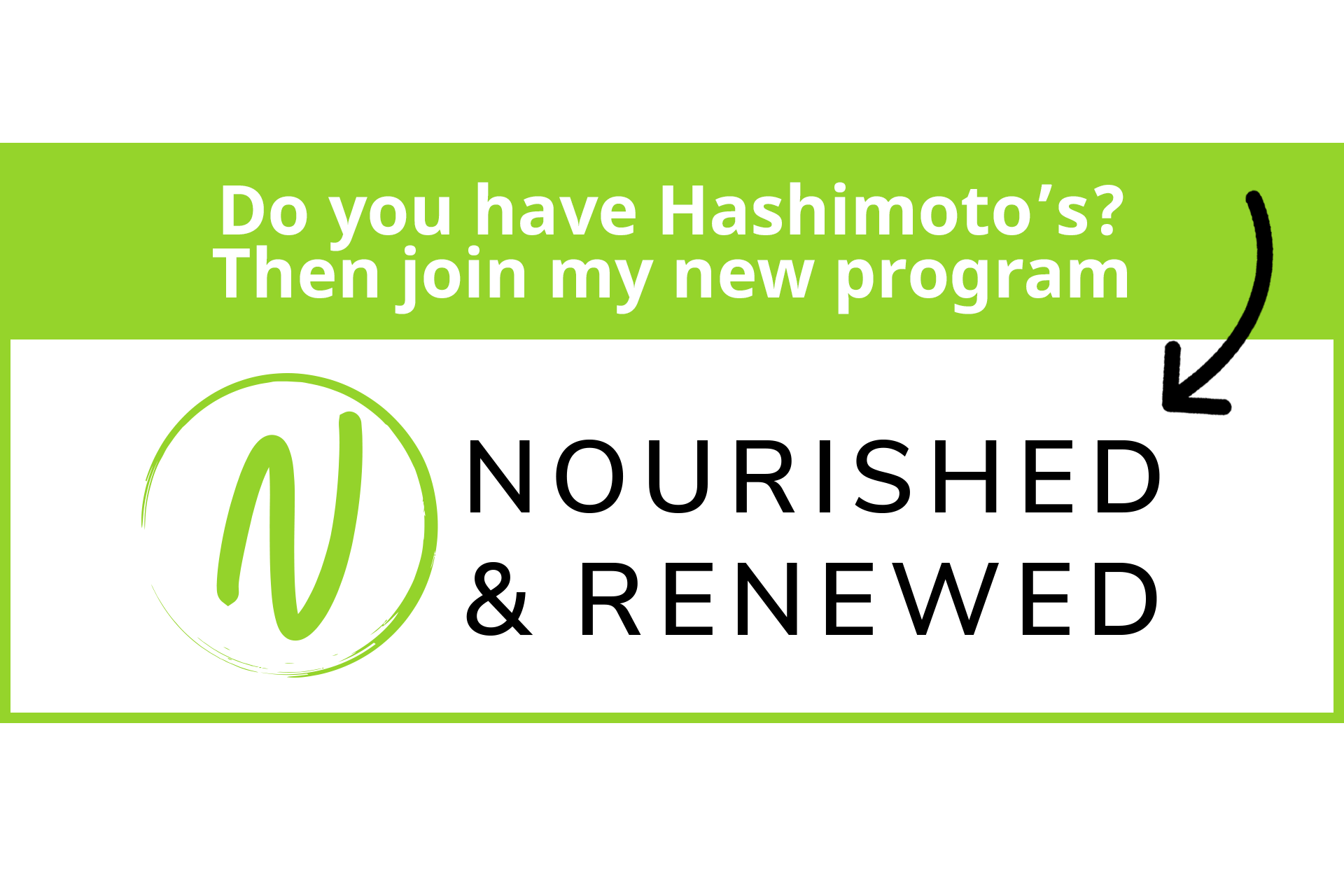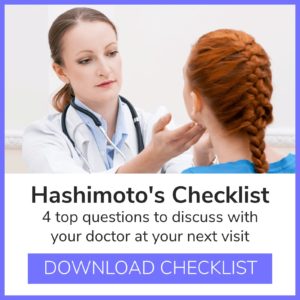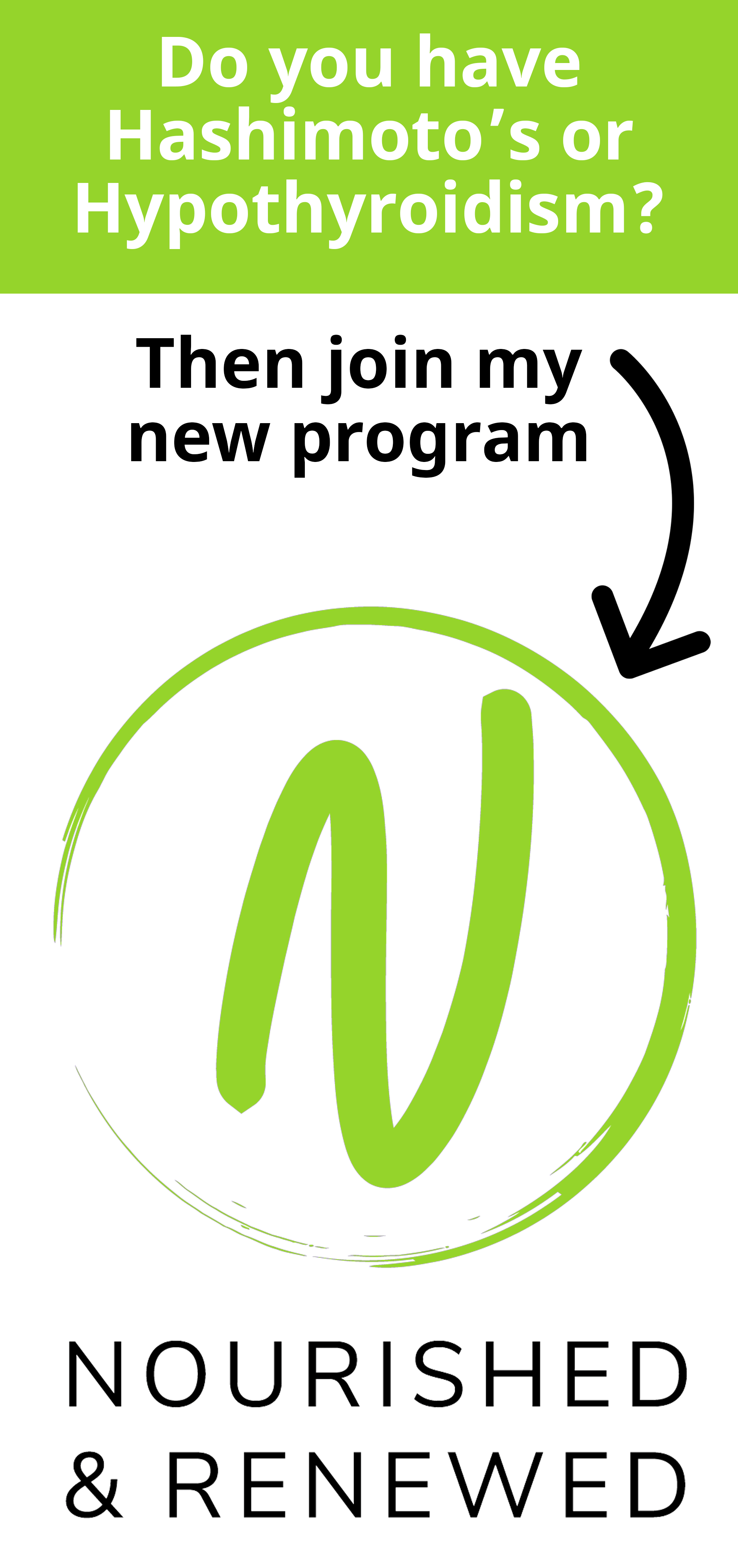If you’re like me, you pop a zinc lozenge if you feel a cold coming on. But this wonder mineral is not just for fighting bugs. It’s also a thyroid powerhouse, making it essential for life with Hashimoto’s.
Because of its role with the immune system, there has been a major highlight on zinc lately.
And for good reason.
The mineral is found in cells throughout the body and plays a part in cell division and growth.
Zinc deficiency is also very common in Americans, but often goes unnoticed or undiagnosed.
If you have hypothyroidism, most often caused by Hashimoto’s Thyroiditis, there are reasons why zinc is even that much more important for you.

The Roles of Zinc In The Body
If you ever researched vitamins and minerals, you may have made it to the end of the nutrient alphabet and learned that zinc is considered an essential trace mineral, meaning our bodies can’t make it so we must get it from outside sources like food and/or supplements.
Perhaps best known for its role in the immune system, zinc supports T cells. T cells are white blood cells that attack virus-infected cells and even cancer cells, while also triggering an immune response in other cells as well.
(If you’ve heard of T cells but you’re not sure how or where, these are the cells that the HIV virus attacks, so we use T cell count to monitor someone’s HIV levels.)
Zinc is also a cofactor, like magnesium, meaning that it is necessary for a number of enzymes to function. In fact, we know of hundreds of enzymes that are dependent on zinc.
Because zinc has anti-inflammatory and antioxidant properties, it has been known to help with preventing skin issues, such as acne, rosacea and eczema, as well as rashes, foot fungus and canker sores.
Men’s reproductive health also relies heavily on zinc. Men with a zinc deficiency are more prone to sperm motility issues and low sperm count.
But if you suffer from hypothyroidism, there are other roles of zinc that we’ll explore later.
Causes and Signs of Zinc Deficiency
It is believed that at least 25% of the world’s population is deficient in zinc.
A large part of this comes from impoverished areas with a lack of nutritious food. But even in the United States, around 12% of people are at risk.
So, how did we get here? How is such a crucial mineral lacking in so many diets here and around the world? There are a number of root causes and they don’t all stem from unhealthy dietary choices.
After all, zinc is found in a wide range of foods, from meats and legumes to vegetables and mushrooms.
But, while many foods contain zinc, very few are actually rich in the mineral.
We’ll get into some of the foods that contain zinc later but for now, consider that, while most people would benefit from getting at least 10mg of zinc, 4 ounces of beef (one of the foods most rich in zinc) contains only about 4mg.

Nutrient Depletion in Soil
One of the problems we are currently facing with zinc and many other nutrients, is our changing landscape of farming.
Plant-based foods now contain much less zinc than they used to due to soil depletion. Because of how we utilize land through farming, zinc levels in soil have decreased greatly over the decades.
This in turn means that livestock consumes less zinc, leading to lower zinc levels in meat over the years.
Problems with Absorbing Zinc
Another possible cause of zinc deficiency, as with many nutrients, is the inability to adequately break down food and access and absorb the vitamins and minerals within.
This can stem from low stomach acid or leaky gut.
But medications can also get in your body’s way of absorbing nutrients.
Signs of Zinc Deficiency
Perhaps one of the only good things to be said for zinc deficiency is that it has a few unique traits.
While many of the signs are common of other types of deficiencies or health issues, some stand out as more obvious to zinc.
Signs include:
- Weight loss or difficulty gaining weight
- Poor wound healing
- Hair loss
- Skin issues such as canker sores, acne, rashes, eczema and foot fungus
- Allergies or frequent colds
- Depression
- Male infertility
- Impaired taste and/or smell
- Brittle nails or nails with white spots on them
Both impaired taste and smell and the white spots on the nails may not only happen with zinc deficiency but they are not common with many other types of deficiencies and are fairly easy to identify.
A lack of hunger during zinc deficiency is thought to come from the impaired taste and smell.
To truly know if you suffer from the deficiency, there are blood tests but some doctors rely on plasma tests.
An at-home test that can be done uses a liquid form of zinc itself.
Although not always thought to be completely accurate, I have found this helpful for clients since it is easy, involves no needles and gives immediate results.
The test involves swishing the liquid zinc around in your mouth for a few seconds before spitting it out. Your results depend on the taste you experience, or lack of taste.
Generally, if you don’t taste anything or if your response is delayed, this can indicate a possible deficiency.
If you immediately notice a very strong bitter or sour taste, you may have adequate zinc levels.
As a bonus, the liquid zinc itself can be used as a supplement if you are deficient.

Zinc Deficiency Risk Factors
Elderly people and those who eat a vegetarian or vegan diet have been found to be more at risk for zinc deficiency.
For the elderly, this can stem from poor absorption, especially as stomach acid decreases with age.
Those who eat a plant-based diet may not get the zinc they need without meat and seafood.
People who suffer from alcoholism also have a higher rate of zinc deficiency.
Zinc and Hypothyroidism
We’ve looked at the importance of zinc in many of the body’s functions and how to know if you may be deficient.
But if you suffer from Hashimoto’s like I do, or another cause of hypothyroidism, there are additional roles of zinc that you may want to better understand.
Hashimoto’s is an autoimmune disorder in which the immune system attacks the thyroid gland.
It is the most common cause of hypothyroidism, which is the underproduction of thyroid hormones. These hormones include thyroxine (T4), which is converted to triiodothyronine (T3), an active form of the hormone.
Production of T4 is regulated by thyroid-stimulating hormone (TSH), produced in the pituitary gland of the brain.
When the pituitary gland is functioning normally, it is released in order to stimulate the release of T4, to then be converted into T3.
In the case of Hashimoto’s, that production can’t happen as well because the attacked thyroid isn’t functioning as well.

The Link Between Zinc and Your Thyroid
But here’s the nutritional kicker: Zinc is required for nearly every step in that process.
Zinc is needed to produce TSH; zinc is needed to create T4; and zinc is needed to convert T4 into T3.
You may have found that your TSH levels are very high but that your T4 and T3 are low.
In some cases, the body will focus dwindling zinc levels on creating TSH, leaving inadequate amounts for T4 and conversion.
In other cases, there may not even be enough for healthy TSH levels, preventing the natural trigger process in the thyroid.
Zinc is also associated with higher risk of autoimmunity: Those with a deficiency have been found to have higher levels of thyroid antibodies, the cells that attack the thyroid.
The Hair Connection To Thyroid Disorders
Hair loss and thinning has a strong association with Hashimoto’s and hypothyroidism. Zinc deficiency related to those disorders may be partly to blame.
The mineral helps with the health of hair follicles. Zinc, along with copper, has been found to be lower than normal in those with hair loss.
How Much Zinc You Actually Need
As with any nutrient, our bodies’ needs can vary greatly depending on many factors, including age and gender. The Recommended Dietary Allowance (RDA) for zinc is:
- 7 months to 3 years: 3 mg
- 4-8 years: 5 mg
- 9-13 years: 8 mg
- 14+ years, female: 8 mg
- 14+ years, male: 11 mg
- Pregnant or lactating female: 11-12 mg
Food Sources of Zinc
As I mentioned before, there are a number of foods with zinc but not a ton that are high in zinc. The biggest exception is oysters. Just one 1 oz oyster contains 8-9 mg of zinc!
Other foods include (but can’t come close to oysters):
- Beef and lamb
- Spinach
- Asparagus
- Mushrooms (especially Shiitake and Crimini)
- Pumpkin and sesame seeds
- Garbanzo beans and lentils
- Quinoa
- Shrimp
- Cashews

One good thing to keep in mind is that, like other minerals, zinc stands up well to cooking.
In fact, sprouting some foods like nuts and seeds has been found to make their zinc more bioavailable.
The Choice to Supplement Zinc
Supplementing always has its pros and cons, its time and place. Zinc, like many vitamins and minerals, can be completely safe for supplementing if you’re careful.
And as always, I recommend food first to try to get your levels in balance.
It is difficult to reach toxic levels of zinc through just food, but with supplementing, it can happen, so always ease in to supplementing with zinc and be aware of the recommendations.
If you choose to supplement with zinc, it can be a good way to help get very low levels up if you suffer from the signs of deficiency.
But supplementing with more than 40 mg each day long-term can increase the risk of depression. It can also lead to lower HDL cholesterol levels (often called the “good” cholesterol).
Zinc as a Piece of the Puzzle
As with any nutrient, zinc is not the one answer to any question. Minerals often work together, play off each other and require balance.
Zinc and copper in particular have to be in the right balance with each other.
In fact, supplementing with too much zinc alone can lead to either a copper toxicity or copper deficiency. Totally odd!
It is often thought best to supplement with both if you supplement with either.

The Right Zinc Dosage To Boost Your Immunity and Thyroid
A safe dosage of zinc for daily use for most people is up to 30 mg.
Although this number looks much higher than the recommended allowance mentioned earlier, it is helpful to remember that nutrients from food is better utilized by the body so less is needed.
I recommend 1 mg of copper for every 15 mg of zinc to keep the ratio balanced.
This would mean 2 mg of copper if you take 30 mg of zinc. If you eat a plant-based diet, you may not need additional copper.
Note that zinc lozenges and zinc supplements have different aims. While zinc lozenges are great for immune health and may help your body fight off colds and other viruses, their purpose is not to raise blood levels of zinc.
Instead, they are meant to help coat the throat with zinc as a way to create a buffer from those viruses and fend them off at the source.
Of course, some zinc will get in the bloodstream but perhaps not at the levels you’re aiming for. A great tool in your immune system toolbox but probably not as helpful for thyroid health.
And if your levels are low, my preferred supplement is Metagenics Zinc A.G.
This formula is tummy-friendly and designed to be well-tolerated by just about everyone.
The dose is perfect for maintaining a good level of zinc. (You can purchase this supplement using the code FAMILY at checkout.)
But, here’s the thing: everyone’s needs are different, so working with a practitioner who is board certified in holistic nutrition is your best bet!
Word of Caution About Zinc Supplementation with Medication
Zinc is considered safe to supplement along with thyroid medications, such as Synthroid and Levothyroxine.
However, there are some other medications that could cause possible interactions, including antibiotics Quinolone, Tetracycline and others, as well as some HIV medications such as Atazavir.
Always talk to your doctor about possible drug and supplement interactions before taking.
Think Zinc
This magical mineral may make you think of your immune system. But for thyroid health, don’t forget to think zinc.
Whether you decide to supplement or aim to get more zinc from your foods (slurp those oysters!), you may be surprised how much this underestimated nutrient can help with your thinning hair, your brittle nails, your not-so-glowing skin, and especially your Hashimoto’s and hormone levels.
Your thyroid will thank you.

More Thyroid Support is Available
If you would like more support with your thyroid health and overall wellbeing, check out my 30-day Nourished & Renewed With Hashimoto’s program.
This is a self-paced online lifestyle program that offers tangible, realistic solutions for improving your Hashimoto’s and your overall health in a way that lasts.
If you are looking for personalized attention to your thyroid, seek out a program and thyroid advocate who can give you the tools and resources to feel your best again.
I would recommend my Happy & Healthy Adult Program for those with possible thyroid health issues.
Working closely together, we can customize a supplement and meal plan regimen just for you.



